
Over 43% of adults in America are obese. Comparatively, nearly 47% of Americans have high blood pressure. But did you know they’re frequently connected? Not only can obesity cause insecurity and discomfort, but it can also lead to a worsening of high blood pressure, which can be life-threatening. In fact, over 65% of people suffering from obesity fall victim to high blood pressure.
In honor of National Hypertension Awareness Month, the team at BMI Surgery is discussing everything you need to know about high blood pressure and obesity. Learn the ins and outs of obesity, high blood pressure, treatments, and more.
What Is Obesity?
Obesity is a condition characterized by excess body fat relative to a person’s height. Obesity is often diagnosed by the BMI (body mass index) Scale, which has four categories: underweight, normal, overweight, and obese.
Your doctor may also measure your waist circumference to inform causes and treatments, with a BMI over 30 considered obese. Obesity isn’t just a cosmetic concern but can change the way your body functions. It can cause heart disease, diabetes, certain cancers, and high blood pressure.
What Is High Blood Pressure?
In honor of National High Blood Pressure Awareness Month, we’re taking a deep dive into obesity-induced high blood pressure. But first, let’s define what high blood pressure is. High blood pressure, also called hypertension, occurs when the force of your blood running through your blood vessels is too high.
High blood pressure is known as a “silent killer” since there are usually little to no symptoms before the condition becomes severe. Hypertension can cause life-threatening problems like heart attack, coronary artery disease, and stroke.
Can Obesity Cause Hypertension?
Obesity can cause hypertension or worsen it if you already have it. People with obesity have more fat tissue than usual, which can cause complex changes in the body in numerous ways. These can include sympathetic nervous system overactivation, insulin resistance, and kidney and hormonal changes.
Obesity-induced hypertension can be harder to treat and sometimes become resistant to medication. Since people with obesity often carry extra fat around their midsection, this excess weight puts pressure on the cardiovascular system. The heart must work harder to pump blood to organs, muscles, and tissues, which can quickly cause cardiovascular stress and other heart problems.
How Is Obesity-Induced Hypertension Treated?
Medications are available to treat hypertension, but many people with obesity are resistant to their effects because of the physical changes the body undergoes when obese. Fortunately, weight loss surgery can help treat obesity-induced hypertension. With weight loss, a healthy diet, and physical exercise, your heart becomes stronger, which can lower high blood pressure.
Weight loss surgery, or bariatric surgery, works by modifying your stomach size to reduce your appetite and reduce your calorie intake. There are different weight loss surgery techniques like gastric sleeve and LAP-BAND. Weight loss surgery should be combined with long-term lifestyle changes like regular exercise and a healthy diet to be successful.
Live a Healthier & Happier Life with BMI Surgery
While obesity and high blood pressure can severely impact your health, each of these conditions is preventable and treatable. This May, we hope you join us in raising awareness about the negative impacts of hypertension and obesity. With your help, we can lower the cases of both conditions nationwide.
If you have obesity-induced hypertension, weight loss surgery can help! Our team of experts can create a personalized treatment plan for you so that you can lead a healthier, more fulfilled life. Our board-certified surgeon, Dr. Long, would be honored to be a part of your weight loss journey!
Interested in Learning More About Weight Loss Surgery? Call Us Today!
For over 20 years, Dr. Long and his team have performed successful weight loss surgeries. If you’re ready to begin your journey toward a healthier, happier life, don’t hesitate to contact BMI Surgery today! Call us at 205-850-1973 or contact us online!



